constituent assembly of india debates (proceedings)- volume vii
constituent assembly of india debates (proceedings)- volume vii
constituent assembly of india debates (proceedings)- volume vii
You also want an ePaper? Increase the reach of your titles
YUMPU automatically turns print PDFs into web optimized ePapers that Google loves.
74. In the meantime we make the following recommendations:--<br />
(a) The existing practice should continue in respect <strong>of</strong> trading operations <strong>of</strong> the Central<br />
Government, i.e., no income-tax should be levied on the pr<strong>of</strong>its. It should be open to the<br />
Centre, however, to levy a contribution, as in the case <strong>of</strong> Railways, for its sole benefit from<br />
such operations. If the trading is carried on by a separate juristic person, tax will be levied<br />
even if the Government is the dominant shareholder.<br />
(b) Tax should be levied on the trading operations <strong>of</strong> Units (as also <strong>of</strong> local bodies),<br />
whether carried on within or without their jurisdiction; and the tax or the contribution in<br />
lieu there<strong>of</strong> should be treated as ordinary income-tax revenue for the purpose <strong>of</strong> the<br />
divisible pool. We presume that if there are no pr<strong>of</strong>its, there will be no contribution; but if<br />
this presumption is wrong, we suggest that the contribution should be treated as part <strong>of</strong><br />
the divisible pool <strong>of</strong> income-tax.<br />
(c) We recommend that quasi-trading operations incidental to the ordinary functions <strong>of</strong><br />
Government such as the sale <strong>of</strong> timber by the forest department or <strong>of</strong> jail products by the<br />
jail department should not be treated as trading operations for this purpose.<br />
Emergency Provisions<br />
75. The needs <strong>of</strong> the Centre in times <strong>of</strong> emergency, such as war or large scale internal disorder,<br />
cannot be provided for through the detailed allocation <strong>of</strong> heads <strong>of</strong> revenue or <strong>of</strong> shares therein. It is<br />
obviously not possible to legislate how emergencies should be met. We would suggest that there should<br />
be a special provision in the Constitution authorising the President in an emergency to suspend or vary<br />
the financial provisions in such manner as he may think best in the circumstances. For example, if there<br />
is a war and an Excess Pr<strong>of</strong>its Tax is levied, it might be necessary for the Centre to retain the whole <strong>of</strong><br />
this tax for itself.<br />
Procedure in Financial Matters<br />
76. Item X <strong>of</strong> our terms <strong>of</strong> reference is as follows:--<br />
"Is it necessary to make any modifications in the existing provisions as regards procedure in financial<br />
matters contained in Sections 33 to 37 and 78 to 83 <strong>of</strong> the Government <strong>of</strong> India Act, 1935?"<br />
77. The present financial procedure in the federal sphere is laid down in sections 33--37 <strong>of</strong> the<br />
Government <strong>of</strong> India Act, 1935. The corresponding clauses in the Draft Constitution as prepared by the<br />
Secretariat <strong>of</strong> the Constituent Assembly are 74, 75 and 77--81. We have two recommendations to<br />
make:--<br />
(1) When a money bill is sent from the Lower House to the Upper, a<br />
certificate <strong>of</strong> the Speaker <strong>of</strong> the Lower House saying that it is a money bill<br />
should be attached to, or endorsed on, the bill and a provision to that effect<br />
should be made in the Constitution on the lines <strong>of</strong> the corresponding<br />
provision in the Parliament Act, 1911. This will prevent controversies about<br />
the matter outside the Lower House.<br />
(2) After clause 80, a provision may be made making it necessary for<br />
Government to approach the Legislature for regularising any excess<br />
expenditure that might be discovered in audit after the close <strong>of</strong> the year.


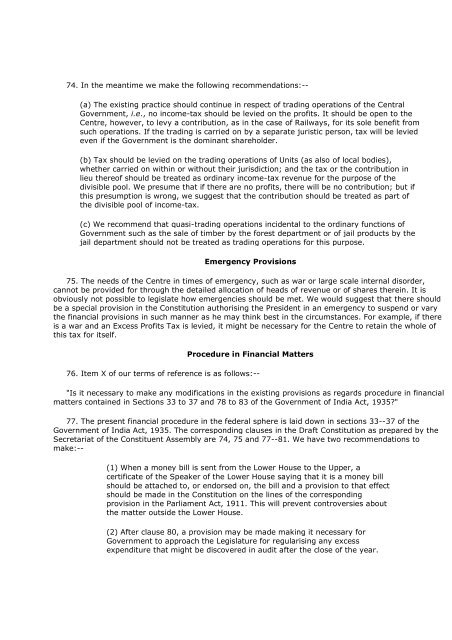
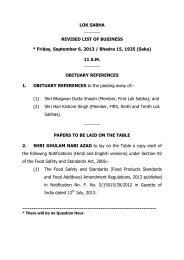
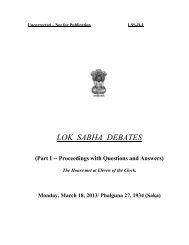
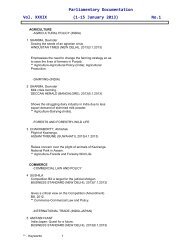
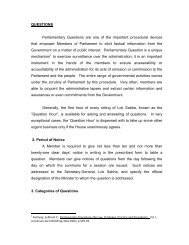
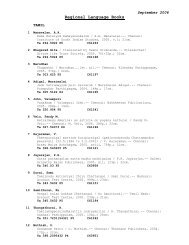
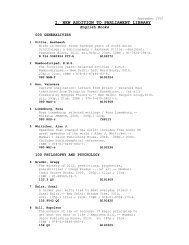
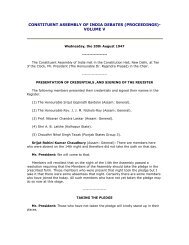
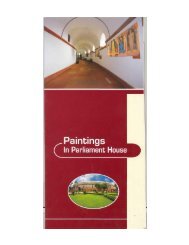
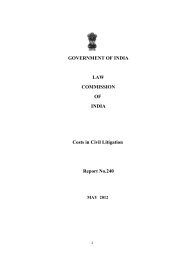
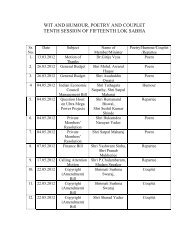
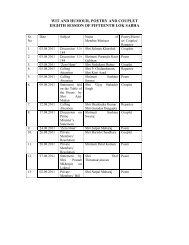

![gÉÉŌ A.]ÉŌ. xÉÉxÉÉ](https://img.yumpu.com/8015720/1/190x245/geeo-aeo-xeexee.jpg?quality=85)
